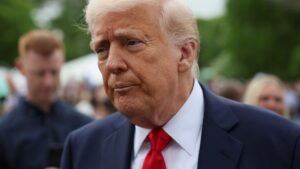—
### The Impact of Presidential Pressure on the Federal Reserve: Insights from the Extreme Investor Network
Recently, President Trump’s public criticisms of Federal Reserve Chair Jerome Powell have sparked significant speculation about the potential for a major shake-up at the central bank. As these discussions unfold, it’s crucial for investors and economists alike to understand what this could mean for U.S. monetary policy and the broader economy.
#### The Independence of the Federal Reserve
One of the most critical points to grasp is the importance of the Federal Reserve’s independence. Historically, the Fed operates free from direct political influence, allowing it to set interest rate policy based on economic conditions rather than political pressures. If President Trump were to move forward with firing Powell, experts warn that it could initiate a troubling shift away from this independence, leading to decisions influenced more by political considerations than by sound economic principles.
Economists like Paul Ashworth from Capital Economics emphasize that simply removing Powell wouldn’t be a cure-all for Trump’s desire for lower interest rates. Instead, it might necessitate the dismissal of other Fed Board members to achieve a desired policy change—an action that could backfire spectacularly. Such a radical move could disturb the markets and lead to a devaluation of the dollar, along with increased long-term interest rates.
#### The Complexity of Fed Dynamics
The dynamics of the Federal Reserve are intricate. While the Chair does wield considerable influence over the Federal Open Market Committee (FOMC), the ultimate decisions require a majority vote from its members. This means that even if Powell were to be replaced, dissenting members could still push back against any political directives aimed at altering monetary policy. Deutsche Bank’s Peter Sidorov highlights this, noting that a change in leadership does not guarantee a shift in the Fed’s approach to policy.
Moreover, historical precedent plays a significant role in how the Fed operates. Michael Feroli, JPMorgan’s chief U.S. economist, pointed out that the leadership’s power largely stems from the trust and deference built over time among committee members. Any abrupt changes prompted by the presidency could erode this trust, leading to increased resistance from Fed members who prioritize economic stability over partisan agendas.
#### The Market Reaction: A Cautious Investor Landscape
The uncertainty surrounding potential changes at the Fed—coupled with ongoing tariff tensions—has affected investor confidence significantly. U.S. stocks, bonds, and the dollar have all seen downturns as markets react to the unpredictable economic environment. The risk of increased inflation looms large, especially with tariffs already contributing to upward pressure on prices.
Experts are voicing their concerns about what diminished independence at the Fed might mean for inflation forecasts. An action by the President that undermines the Fed’s credibility could result in increased inflation expectations, which would further destabilize the economic landscape.
#### Looking Ahead: The Importance of Vigilance
As we navigate these complex issues, it’s vital for investors to remain vigilant and informed. At Extreme Investor Network, we’re committed to providing you with real-time insights and analysis that empower you to make informed investment decisions. While the potential for changes at the Fed creates uncertainty, there are also opportunities for proactive investors who can adapt to shifting market conditions.
As these developments continue to unfold, stay tuned for more expert analyses and market insights that you won’t find anywhere else. Your investment success depends on being informed and prepared for whatever twists and turns the economic landscape may present.
—
By choosing Extreme Investor Network as your trusted source for economic insights, you position yourself to navigate the complexities of today’s market with confidence. Join us to stay ahead of the curve.
—

